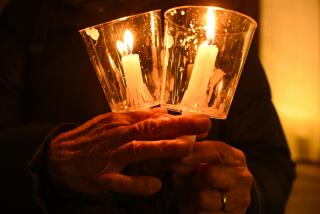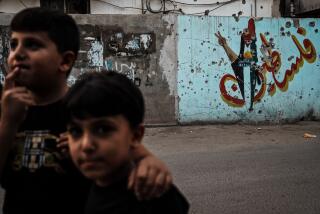A Half Brother Defends Hussein’s Role in Dujayl
- Share via
BAGHDAD — Saddam Hussein’s half brother testified in defense of the deposed dictator’s character on Monday, giving an unapologetic narrative that seemed crafted not only to deflect criminal charges but also to burnish Hussein’s legacy.
The testimony marked the first time lawyers have mounted a vigorous defense of the former Iraqi president, who has been charged with crimes against humanity.
In a monologue that infused the courtroom with a sense of historical sweep, Sabawi Ibrahim Hassan Tikriti, Iraq’s long-dreaded intelligence boss, described Hussein as a benevolent leader who delighted in roaming the provinces to meet common Iraqis and labored to create a fair country.
Speaking from a partially curtained witness booth, he acknowledged that Hussein’s regime was harsh, but argued that a tough government was necessary to defend a country that was at war with Iran.
In an outburst sure to stir sectarian tensions, Hassan also used the televised trial to blast the Shiite political party of Iraq’s new prime minister. The Islamic Dawa Party conspired to kill Hussein on Iran’s behalf, he said.
“Anyone saying that the Dawa Party is not a bloody party, let them come and discuss it with me,” Hassan said. “You call the national resistance ‘terrorists.’ Well, I won’t call the Dawa Party ‘terrorists,’ but I will say that they are bloody.”
By contrast, Hassan described Hussein as a man who “was never offensive or hostile. He was a peace-loving man who cared for the welfare of the sons of his country.
“Everybody knows that Saddam Hussein was visiting and inquiring about the living conditions of his countrymen everywhere in Iraq,” he said.
Hassan’s testimony did little to undercut charges that Baath Party officials had massacred, tortured and forcibly deported villagers in the mostly Shiite town of Dujayl. Prosecutors allege that the president and his codefendants carried out the massacre after Hussein survived an assassination attempt while visiting the town in 1982.
But in his remarks, the former intelligence boss strove to create a sense of historical justification for the deaths. The Iran-Iraq hostilities were not provoked by Iraq, he argued. Iran’s Ayatollah Ruhollah Khomeini had implied that Iraq was ruled by non-Muslims, he said, and had interfered in Iraq’s internal affairs through proxies in Iraq’s Shiite parties.
He implied that a heavy-handed response to the assassination attempt was appropriate.
“I know that there were certain measures taken,” Hassan said. “We were in a state of war and it was an aggression that took place against the leader. It was discovered that this operation was encouraged by Iraq’s enemy....
“It would have been a disaster if no firm measures had been taken at that time.”
The punishment meted out by security officials was “exaggerated,” Hassan said. Then he quickly pinned the deaths not on Hussein, but on a security official who was a childhood friend of Hussein’s. The official later fell out of favor with the notoriously capricious president and died in prison.
“The Americans would use a cannon to attack a fly under the banner of security. They would not hesitate,” Hassan said. “When a president of a country is targeted, this means the attack was launched against Iraq and the sovereignty of Iraq.”
In fact, Hassan said, it was he -- not Hussein -- who preached vengeance against the people of Dujayl after the assassination attempt. The president urged moderation and patience, he said.
“He said, ‘Listen, Sabawi, let us wait until the investigations tell us more. I ask you please not to prejudge and have such an attitude toward Dujayl and its people,’ ” Hassan said.
“He told me that the Iranians might exploit this kind of incident in order to tell the world that the Iraqi people don’t like Saddam.”
A habitual expression of stony indignation fell from Hussein’s face after Hassan took the stand. The former president flashed toothy grins and turned his head from side to side when his half brother sparred with the judge.
Hassan was captured by the Americans after the fall of the regime and remains in prison. He appeared in court clad in traditional white robes and a headdress. During a particularly sharp exchange with the judge, he snapped that despite his clothing he held a doctorate in law and was not a simple farmer.
From the first moments, the trial crackled with tension. Judge Raouf Rasheed Abdel Rahman’s first official act was to toss one of the defense lawyers out of the courtroom. The argument began as soon as he caught sight of Bushra Khalil, a Lebanese Shiite who has clashed with the court in the past.
“In the last session we sent you out of this court,” the judge told her. “You have to stick to the rules.”
Khalil stood and asked the judge to explain the rules so she wouldn’t repeat her mistake. The judge lost his temper and ordered her to sit. When she stayed on her feet, he ordered bailiffs to haul her from court.
“Wait a moment,” she said, ripping off her lawyer’s robe and heaving it toward the judge as the bailiffs approached. Khalil was quickly forced out of the room, slapping at the bailiffs and screaming.
“Get your hands off me!” she shouted.
“I was stunned and shocked,” Khalil said by telephone after the trial. “I think that because I am a Shiite woman from a religious family, that is something that confuses them.”
Hussein, who had arrived at the courtroom with downcast eyes and a Koran in hand, piped up in her defense.
Reviving one of the old gestures of dictatorship, he jabbed a finger toward the judge and yelled in protest.
“This does not concern you,” the judge told him, shaking his gavel in Hussein’s direction.
“I am Saddam Hussein. I am the president of Iraq,” the former president shot back. “Your accusations don’t change anything. I am over your head.”
More to Read
Sign up for Essential California
The most important California stories and recommendations in your inbox every morning.
You may occasionally receive promotional content from the Los Angeles Times.













